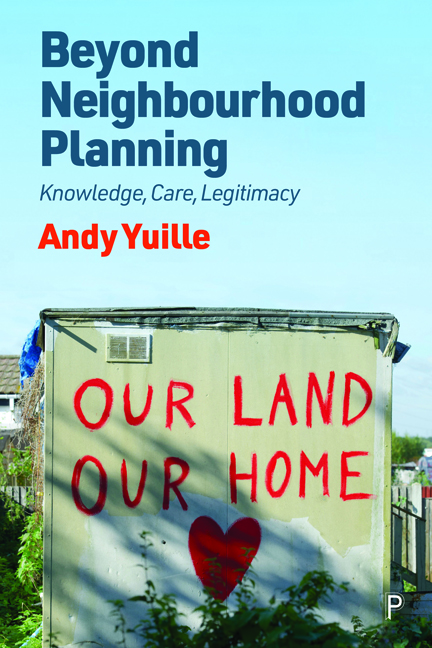Book contents
- Frontmatter
- Contents
- List of figures and table
- Acknowledgements
- Preface
- 1 Introduction: Neighbourhood planners and the turn to participation
- 2 Planning, participation and democratisation
- 3 Knowledge, politics and care: perspectives from Science and Technology Studies
- 4 Neighbourhoods, identity and legitimacy
- 5 Experience, evidence and examination
- 6 Expertise, agency and power
- 7 Care and concern
- 8 Conclusion: Neighbourhood planning and beyond
- Notes
- References
- Index
Preface
Published online by Cambridge University Press: 20 January 2024
- Frontmatter
- Contents
- List of figures and table
- Acknowledgements
- Preface
- 1 Introduction: Neighbourhood planners and the turn to participation
- 2 Planning, participation and democratisation
- 3 Knowledge, politics and care: perspectives from Science and Technology Studies
- 4 Neighbourhoods, identity and legitimacy
- 5 Experience, evidence and examination
- 6 Expertise, agency and power
- 7 Care and concern
- 8 Conclusion: Neighbourhood planning and beyond
- Notes
- References
- Index
Summary
From 2006 I have led policy and campaigning work for a variety of environmental non-governmental organisations (NGOs) and community groups – primarily the Campaign to Protect Rural England. I often represented these groups in the planning system and other forums that were ostensibly intended to widen public and stakeholder participation in decision making and incorporate a wide range of knowledges and values. I found that much of what I was doing was acting as a translator, taking the lived experiences of individuals and groups and transforming them into technical jargon and instrumentalised arguments that would fit into particular policy pigeonholes: turning them into something other than what they were presented to me as, to enable them to have traction in formal and sometimes intimidating settings.
I also observed members of the public and community groups representing themselves, particularly in formal spatial planning settings. They often expressed themselves eloquently and passionately, to apparently sympathetic planning inspectors who listened carefully, ensuring that everyone felt that they had had the opportunity to fully contribute. However, that testimony would often then be all but discarded because it didn't fit easily into the scales with which the ‘planning balance’ was weighed. Even in these theoretically inclusive forums, the things that really mattered to people were often excluded and made invisible: what Science and Technology Studies scholar John Law describes as being ‘othered’. Representing community groups and NGOs in other technocratic locations, such as the North West Regional Assembly, Regional Development Agency and Government Office, I found debate foreclosed because the questions and problems to be considered were framed in particular ways, and there were unofficial but taken-for-granted restrictions on the types of knowledge and value considered valid. The discourse of neighbourhood planning emphasised local, experiential knowledge – people were portrayed as being qualified to plan for a place because of their experience of living there.
Then, in 2011, the government introduced neighbourhood planning through the Localism Act, enabling community groups to write their own land use planning policies, to decide what evidence was needed to support them, and to produce that evidence.
- Type
- Chapter
- Information
- Beyond Neighbourhood PlanningKnowledge, Care, Legitimacy, pp. vi - viiiPublisher: Bristol University PressPrint publication year: 2023

